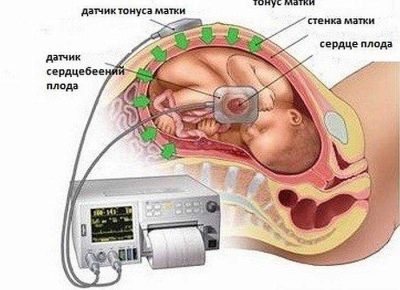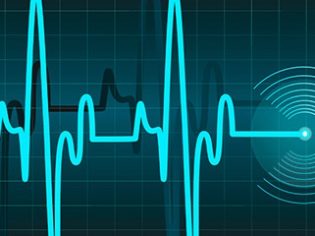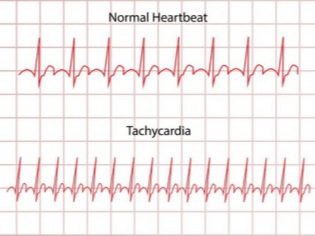What should be the pulse during pregnancy is normal?
Future mom's heartbeat is a very important clinical indicator. He is estimated at the earliest stages of pregnancy. If its indicators deviate from the norm, a mandatory correction of violations is required.
About heartbeat in pregnant women
The speed of the heartbeat or pulse is a very important clinical sign. During pregnancy, this indicator is determined by both the expectant mother and the baby.
In a child, the heartbeat can be determined in the very first weeks of its intrauterine development. Calculate the number of heartbeats in the fetus can be during an ultrasound examination, and at later terms - during a clinical examination by a doctor.
It is important to note that the normal pulse rates during pregnancy are somewhat different.
This is due to many factors. The main reason - the changing hormones. During pregnancy in the female body produced a lot of different hormones. They have an impact on the work of cardiac activity, which leads to a change in the heart rate.
Doctors determine heart rate together with the determination of blood pressure. There is always a strong relationship between these clinical indicators.
In most cases, a pulse change is often accompanied and irregular blood pressure. For a comprehensive assessment of women's health, doctors evaluate both of these indicators.
Many future moms in the early stages of carrying a baby's pulse becomes somewhat speeded up. As a rule, frequent heartbeat is normalized by the end of the third trimester of pregnancy. If this does not happen, Mandatory consultation with a cardiologist is required.
According to statistics, in future moms after 25-30 years during pregnancy, the heart rate increases markedly. Low pulse is more common in women who have conceived a baby before the age of 20 years. The exception is the presence of congenital heart disease, which can lead to the development of arrhythmia.
Overweight is another reason that can cause a woman’s pulse to increase during pregnancy. The uterus increasing in sizes leads to the fact that from the end of the second trimester it begins to exert strong pressure on the diaphragm. This situation and contributes to the work of the heart in an intense and often altered mode.
A significant decrease in hemoglobin or red blood cells in the blood provokes the development of anemia in the expectant mother. This pathological condition also quite often leads to the development of tachycardia in a woman. In this case, the heartbeat can be normalized with the help of drugs normalizing hemoglobin in the blood. Quite often, in this case, doctors prescribe iron-containing drugs.
The physiological characteristics of the baby developing in the female tummy can also lead to an increase in the mother's heartbeat. According to statistics, tachycardia (high pulse) is found in a woman carrying a large baby.
Multiple pregnancies are another risk factor for the development of heart palpitations during pregnancy.
Psychoemotional stresses have a significant effect on the work of the cardiovascular system. If the future mom is constantly experiencing or nervous over trifles, then this may contribute to the fact that she will have problems with heart palpitations.During pregnancy, one should limit stress as much as possible and allow only positive emotions into one's life.
If, during pregnancy, the expectant mother becomes ill with any infection, this leads not only to an increase in her body temperature and the appearance of symptoms of intoxication, but also to rapid heartbeat. Thus, the body tries to get rid of viral or bacterial toxins. After recovery, the heart rate normalizes.
Harmful habits also contribute to the fact that a woman's heart rate increases significantly. Smoking or drinking alcohol leads to serious tachycardia attacks that are dangerous for a woman. Also increases the pulse contributes to the use of coffee and strong tea.
Heart rate depends on many factors. For example, if the future mom, before conceiving a baby, was professionally or actively involved in sports, her pulse would be somewhat reduced. This is due to the good fitness of the heart muscle (myocardium). Typically, these women significantly reduced the risk of developing tachycardia.
An excessively reduced heartbeat or bradycardia may also occur in a woman due to various infectious heart diseases. Pathologies in which potassium and magnesium are reduced in blood can also lead to a significant slowdown in heart rate.
Also, the development of this condition leads to long-term medication with a hypotensive effect. If for some reason, the expectant mother is forced to take diuretics (diuretic) means, then the risk of reducing heart pulsations in her significantly increases.
The development of bradycardia also leads not only to heart disease, but also to pathology of the kidneys, liver, and other biological systems. In this case required additional diagnostics to clarify the causative factor of the violations. In such a situation, a woman should visit her therapist.
Norms
Most mummies pulse during pregnancy is 85-90 beats per minute. In the first trimester, it practically does not differ from normal values before conception.
If a woman has a heart rate of more than 120 beats per minute at this time, this may indicate the development of any pathology. In this case, a mandatory consultation with a doctor is required.
During the second trimester of pregnancy, heart rate increases by 10-15 beats per minute. In most cases, the speed of the heartbeat in future moms are 100-105 beats per minute during this period.
The final period of pregnancy is very important. Many expectant mothers pulse at this time rises to 115-120 beats per minute. There is no significant change in heart rate per week of pregnancy during this period. Usually, the pulse itself normalizes to ninth month carrying babies.
For the convenience of detecting pathologies, doctors use tables in which normal values of heart rate are indicated at different periods of pregnancy. Every future mommy should have this indicator within her age limit.
Decrease or increase heart rate requires the compilation of medical recommendations.
Symptoms
Heart palpitations leads to the fact that the future moms begin to appear adverse clinical signs. If this condition develops suddenly and is too pronounced, then this can lead to a significant deterioration in the woman’s well-being.
Future mom suffering from tachycardia, often complains of severe dizziness. This symptom often manifests itself when changing the position of the body.If a woman rises abruptly out of bed, then “flies” begin to flash before her eyes, or she begins to see white circles before her eyes.
Headache is another symptom that worries the future mom who suffers from tachycardia. Its severity may be different. Usually the headache worries the future mom constantly. In the evening, this symptom may increase.
Some women begin to feel "Congestion" in the chest. Often this symptom appears in the middle or in the left half of the chest. Many women say that it becomes difficult for them to do even the usual physical exertion. An attack of heart palpitations can occur in them even after cleaning the apartment or after climbing the stairs.
Increased chilliness of the skin can also be a consequence of impaired blood supply. Rapid pulse contributes to the fact that the full blood saturation of the internal organs does not occur.
The skin becomes pale. In severe tachycardia, when the pulse rises above 150 beats per minute, the woman’s nasolabial triangle area and the mucous membranes of the lips turn blue.
How to check yourself?
To determine the pulse at home is quite simple. It is best to determine it at the points where the pulsation of the arteries is most pronounced. One of these zones is the region of the lower third of the forearm, near the fold of the palm.
Heartbeat counting is performed in one minute. If a woman has no arrhythmia or heart rhythm disturbances, then in such a situation a pulse can be counted in 30 seconds. The number of contractions is multiplied by 2. In the presence of any pathologies of the cardiovascular system, accompanied by the development of arrhythmias, pulse should be counted in a minute.
During the determination of the pulse counts the number of "jolts". In order to determine them, the radial artery is pressed against the bone with the finger of the other hand. To determine the pulse yourself at home is pretty easy.
You can also determine the heartbeat using special devices. In every modern tonometer there is a function to determine the pulse.
Even in healthy women, the number of heartbeats can be different on the right and left hands. If these figures differ by more than 20%, then be sure to consult with your doctor.
What to do with the changes?
With the appearance of adverse symptoms, the expectant mother should immediately consult a doctor. The therapist controls the heartbeat during the entire period of pregnancy with the expectant mother.
If necessary, the doctor may send the future mom for additional research. These include ECG and echocardiography.
After the future mother is diagnosed, the doctor makes a whole set of recommendations. They necessarily include the observance of the correct mode of the day. Normalization of the cardiovascular system is possible only with the exception of any psycho-emotional stress.
Good sleep is a very important condition for optimal functioning of the nervous and cardiovascular systems. For this, doctors recommend the future mom to sleep at least 8-9 hours a day. If a woman has difficulty falling asleep, then she should air the room before getting into bed.
Regular walks in the fresh air are a very important condition for the treatment of tachycardia. The rhythm of walking should be moderate. Pregnant women with heart palpitations should avoid running. The duration of the walk should be at least 40 minutes daily.
Often, the appearance of imbalance of vitamins and microelements leads to the appearance of tachycardia in the female body during pregnancy.
In order to normalize this condition, the doctor recommends the expectant mother to use multivitamin complexes. As a rule, such drugs are used in all periods of pregnancy.
Excessive physical activity should also be excluded. Pick up such training, in which the pulse will remain within the normal range. These primarily include regular walks in the fresh air or yoga classes. You can also attend special respiratory courses that are organized for expectant mothers.
During pregnancy, the future mom should regularly visit the therapist. These appearances should not be missed.. During the consultation, the doctor must determine the pulse and blood pressure of the future mom. In this case, the specialist can quite successfully identify any emerging pathology.
To normalize heart rate, you should exclude coffee from your daily menu. For expectant mothers with tachycardia, it is better to use herbal teas or medicinal herbs. Also as drinks suitable fruit drinks or fruit drinks made from various berries.
When a woman has a tachycardia attack very important to keep calm. It is better that at this moment one of her close relatives was with the future mother.
The next important condition is to improve the flow of oxygen into the room. To do this, open the windows, and in the winter - the window in the room where the expectant mother is.
A woman should lie on a bed or sofa. In this position, the risk of developing severe dizziness is somewhat reduced. It is better not to make sharp movements.
After that, be sure to measure the pulse. If its values exceed 120 beats per minute or more, and the woman's health has deteriorated, you should call the ambulance team. To take drugs to normalize heart rate can only be prescribed by the attending physician. Self-medication may contribute to harm to the baby.
Frequent attacks of tachycardia during pregnancy is an unfavorable symptom. If the expectant mother feels an irregular heartbeat or “interruptions” in the work of the heart even in a state of complete rest, she should immediately go for a consultation with a doctor.
Women who have a history of developing cardiovascular pathologies in close relatives should monitor their pulse throughout their pregnancy.
We recommend to watch the following video, in which you will find all the necessary information about the pulse.




































